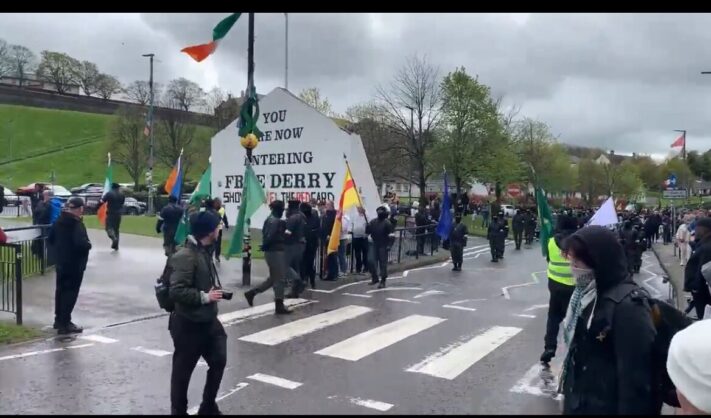 Police believe violence in Derry on Easter Monday was orchestrated by the New IRA to stop the PSNI from investigating a dissident republican parade, a court has been told.
Police believe violence in Derry on Easter Monday was orchestrated by the New IRA to stop the PSNI from investigating a dissident republican parade, a court has been told.
Thomas Moore (55), of Farran Park, in the city, faced Derry Magistrates’ Court today via video link from Musgrave PSNI station charged with offences under the Terrorism Act
His defence claimed he was at the parade in a “professional capacity” providing security.
A solicitor argued that Moore had provided security at numerous events in the city, including a visit by former US president Bill Clinton.
Moore was charged with managing a meeting in support of the IRA.
He was further charged with aiding and abetting unknown persons in wearing paramilitary clothing in support of a proscribed organisation and aiding and abetting unknown persons in failing to comply with conditions imposed by the Parades Commission.
The annual parade in Derry, which marks the Easter Rising against British rule in Dublin in 1916, involved a colour party of people carrying flags and wearing paramilitary-style uniforms with their faces covered.
The march, which started in Creggan estate, concluded with speeches at Free Derry corner in the Bogside area of the city.
Nearby, a crowd of mostly young people threw several petrol bombs and fireworks at police vehicles stationed close to the city’s historic walls overlooking the Bogside.
In a change of approach from recent years, the organisers of the parade – the National Republican Commemoration Committee – had applied to the Parades Commission for permission for the Easter Monday event.
In its determination allowing the march to proceed, the commission explicitly prohibited the wearing of paramilitary-style clothes and flags linked to proscribed organisations.
When asked by the court clerk if he understood the charges, Moore replied: “I do.”
A PSNI detective inspector said he could connect Moore to the charges.
The officer said the Derry parade was an annual event which “traditionally results in significant public disorder”.
He said on Monday a number of the participants were masked and observed to be wearing paramilitary-style uniform.
Said the senior detective: “This was a direct failure to comply with first condition set by the Parades Commission.”
The officer said Moore was identified by an air support unit directing a group of masked men to the parade starting point.
He added: “There were several outbursts of public disorder with petrol bombs being thrown at police by youths.
“One petrol bomb struck a building that needed to be extinguished by police.
“It is assessed that this is highly likely to have been orchestrated by the New IRA to prevent police from disrupting the now illegal parade.”
The officer said approximately 50 fireworks and 50 petrol bombs were thrown at police and some local roads had to be closed.
The detective inspector told the court that at the end of the parade Moore was observed walking to a dark coloured gazebo.
He said: “The only purpose of this gazebo appears to be to facilitate the changing of clothes by the masked and uniformed parade members.
“At that stage police believe young people were shamelessly and deliberately used to distract police from that area and distract police from gaining evidence of people changing out of their parade clothing.”
The officer said police believe Moore had an “active role” in the parade and objected to bail on the grounds of potential witness interference.
Defence solicitor Derwin Harvey said Mooret had worked in the security business for 35 years and had stewarded many events in the city including the Derry Halloween Festival, the Clipper Festival, the St Patrick’s Day parade, Irish international football matches, music festivals and president Clinton’s visit.
The lawyer said: “In his stewarding capacity he manages the safety of participants and plays no role in organising any event or what is happening.”
He told the court that Moore had been named as a steward for the parade in the application submitted to the Parades Commission.
Deputy District Judge Brian Archer said he would grant bail in the sum of £500.
However, a prosecution lawyer said that decision would be appealed to the High Court in Belfast.
The judge said he would give the prosecution two hours to lodge the appeal.
The case was adjourned until Thursday, May 22.
Tags:




